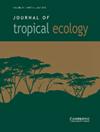Influence of rhizosphere activity on litter decomposition in subtropical forest: implications of estimating soil organic matter contributions to soil respiration
IF 1
4区 环境科学与生态学
Q4 ECOLOGY
引用次数: 1
Abstract
Litter decomposition plays an important role in the carbon cycle and is affected by many factors in forest ecosystems. This study aimed to quantify the rhizosphere priming effect on litter decomposition in subtropical forest southwestern China. A litter decomposition experiment including control and trenching treatments was conducted using the litter bag method, and the litter decomposition rate was calculated by litter dry mass loss. Trenching did not change soil temperature, but increased the soil water content by 14.5%. In this study, the interaction of soil temperature and soil water content controlled the litter decomposition rate, and explained 87.4 and 85.5% of the variation in litter decomposition in the control and trenching treatments, respectively. Considering changes in soil environmental factors due to trenching, the litter decomposition rates were corrected by regression models. After correction, the litter decomposition rates of the control and trenching treatments were 32.47 ± 3.15 and 25.71 ± 2.72% year–1, respectively, in the 2-year period. Rhizosphere activity significantly primed litter decomposition by 26.3%. Our study suggested a priming effect of rhizosphere activity on litter decomposition in the subtropical forest. Combining previous interaction effect results, we estimated the contributions of total soil organic matter (SOM) decomposition, total litter decomposition, and root respiration to soil respiration in the subtropical forest, and our new method of estimating the components of soil respiration provided basic theory for SOM decomposition research.亚热带森林根际活动对凋落物分解的影响:估算土壤有机质对土壤呼吸贡献的意义
垃圾分解在森林生态系统的碳循环中起着重要作用,受到多种因素的影响。本研究旨在量化中国西南亚热带森林根际引发对枯枝落叶分解的影响。采用垃圾袋法进行了包括控制和挖沟处理在内的垃圾分解实验,并通过垃圾干物质损失计算了垃圾分解率。挖沟不改变土壤温度,但增加了14.5%的土壤含水量。在本研究中,土壤温度和土壤含水量的相互作用控制了枯枝落叶的分解率,并分别解释了控制和挖沟处理中枯枝落叶分解变化的87.4%和85.5%。考虑到挖沟引起的土壤环境因素的变化,通过回归模型对枯枝落叶分解率进行了校正。校正后,在2年的时间里,对照和挖沟处理的枯枝落叶分解率分别为32.47±3.15和25.71±2.72%。根际活性对枯枝落叶分解的促进作用达26.3%。结合以往的相互作用效应结果,估算了亚热带森林土壤总有机质(SOM)分解、凋落物总分解和根系呼吸对土壤呼吸的贡献,为SOM分解研究提供了基础理论。
本文章由计算机程序翻译,如有差异,请以英文原文为准。
求助全文
约1分钟内获得全文
求助全文
来源期刊

Journal of Tropical Ecology
环境科学-生态学
CiteScore
2.10
自引率
0.00%
发文量
44
审稿时长
18-36 weeks
期刊介绍:
Journal of Tropical Ecology aims to address topics of general relevance and significance to tropical ecology. This includes sub-disciplines of ecology, such as conservation biology, evolutionary ecology, marine ecology, microbial ecology, molecular ecology, quantitative ecology, etc. Studies in the field of tropical medicine, specifically where it involves ecological surroundings (e.g., zoonotic or vector-borne disease ecology), are also suitable. We also welcome methods papers, provided that the techniques are well-described and are of broad general utility.
Please keep in mind that studies focused on specific geographic regions or on particular taxa will be better suited to more specialist journals. In order to help the editors make their decision, in your cover letter please address the specific hypothesis your study addresses, and how the results will interest the broad field of tropical ecology. While we will consider purely descriptive studies of outstanding general interest, the case for them should be made in the cover letter.
 求助内容:
求助内容: 应助结果提醒方式:
应助结果提醒方式:


